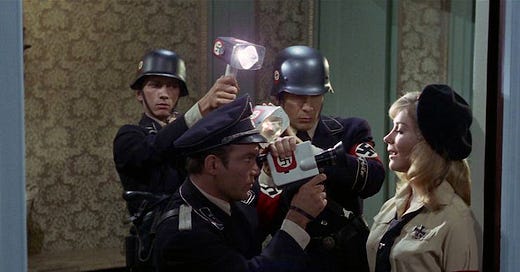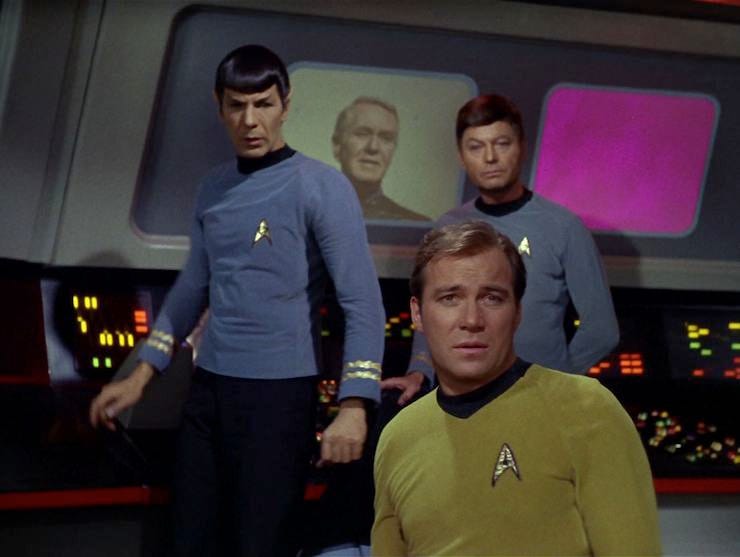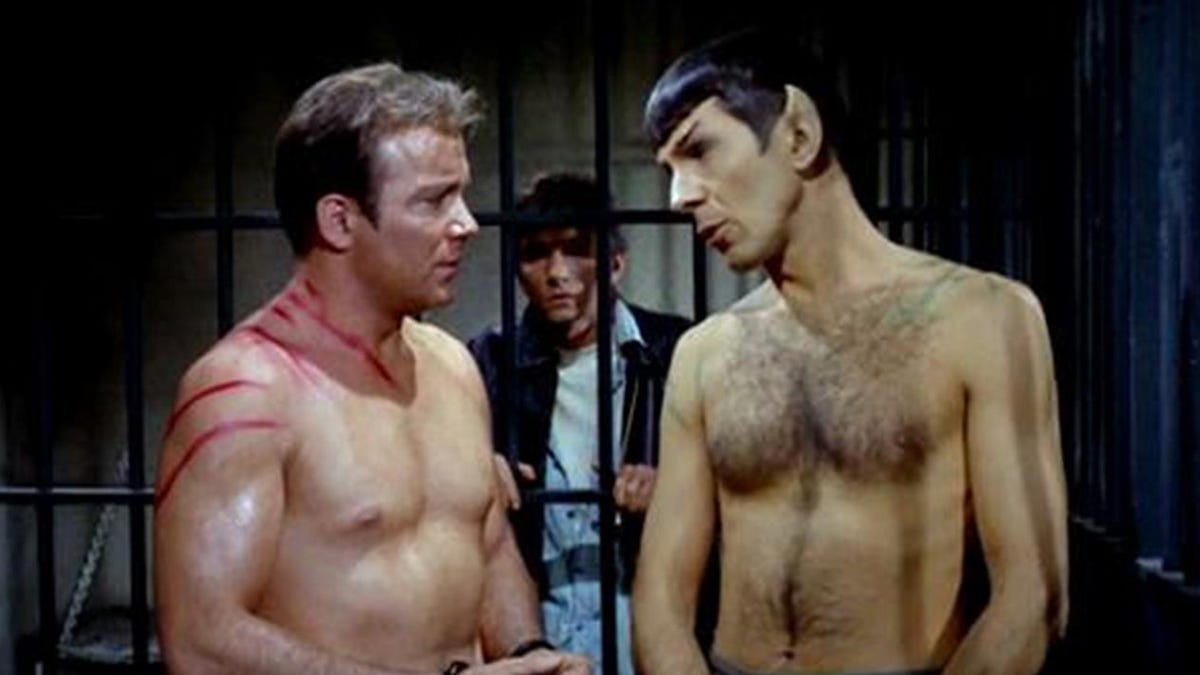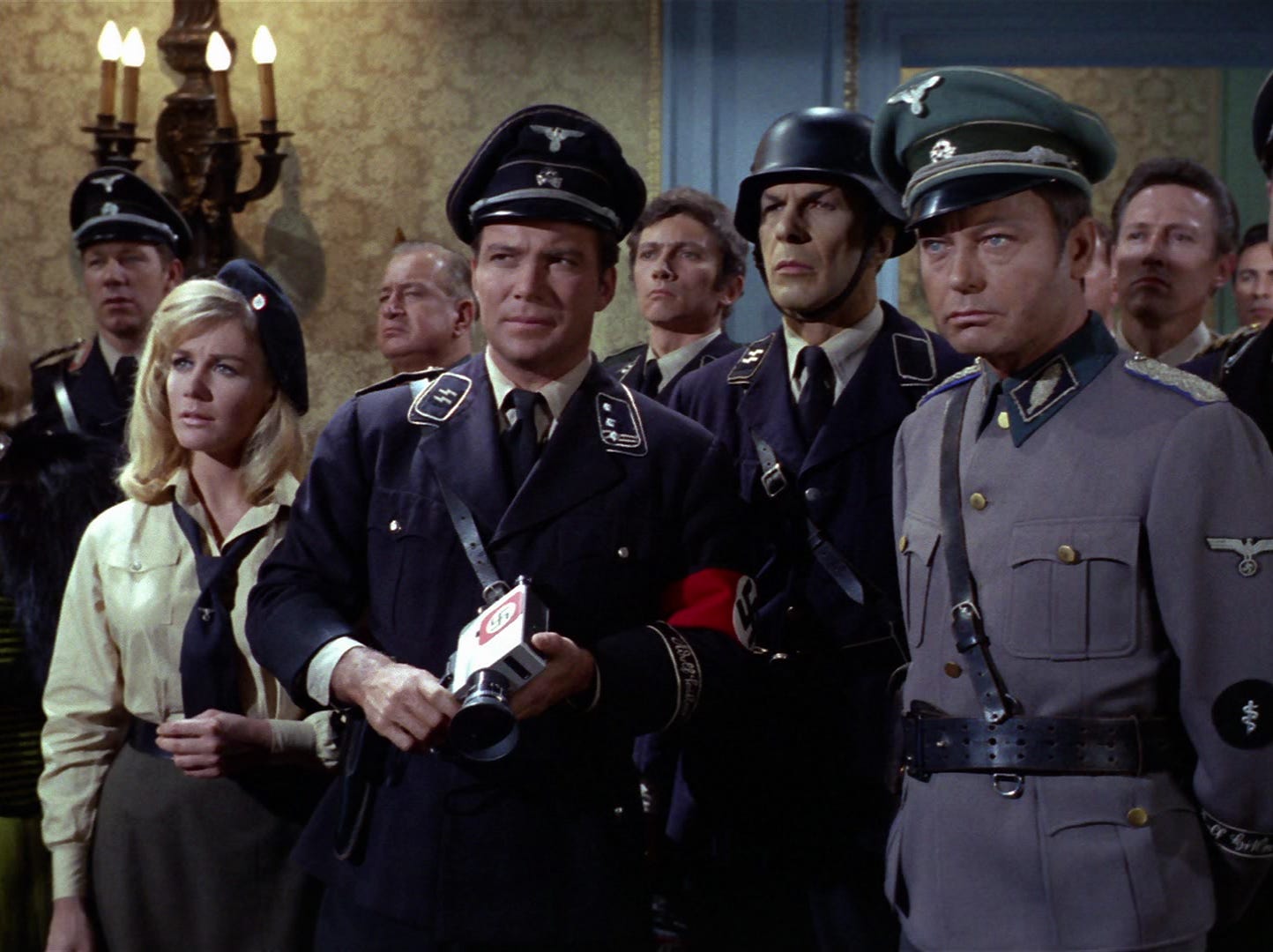"Patterns of Force" - Season 2, Episode 21
"Fascism without the bad parts" turns out to be an oxymoron
Political discourse in the 2020s, in an unfortunately necessary way, often requires one to define what they mean with the term “fascism.” Since the end of WWII, the term has an overwhelmingly negative connotation in America, despite popular fascist movements like the German-American Bund and the America First Committee that arose before America’s war with Nazi Germany, meaning that it can be politically expedient to labels one’s adversaries with the term. Fascist sentiment seems unquestionably on the rise in the country today; its new relevance in describing the economically populist, xenophobic, and explicitly patriarchal policies popular in Republican Party politics today means that the term is more litigated than it has been at any time since the 40s. In some ways, it is depressing that an episode like “Patterns of Force” comes off so comparably light and clear. There was simply nothing to fear from fascism in 1968. It was defeated. But because of that, there is no doubt as to what, and who, this episode is speaking about. “Patterns of Force” is a surprisingly good time, and where it is not expertly executed nor intellectually rigorous, it is at least morally clear.
A top priority in “Patterns of Force” appears to have been getting Kirk and Spock in disguise in Nazi uniforms. It wastes no time. After heading to the planet Ekos to track down a missing Federation cultural expert - and Kirk’s former professor of history at Starfleet Academy - John Gill, the Enterprise is nuked upon arrival. This proves concerning for two reasons. One, the ship was hit with a hostile nuclear warhead, although it shrugs it off thanks to phaser and shield defenses. Two, nukes are far beyond the last known technological capabilities of Ekos. Zeon, neighbor of the violent and anarchic Ekos, was similarly underdeveloped, and known as a place of peaceful intellectualism regardless. Something is rotten here. Kirk and Spock beam down to Ekos to find Gill and gather information.
The crew analyze the situation and discuss the missing John Gill, pictured above them. Gill was played by David Brian, who appeared with Joan Crawford, Bette Davis, Gary Cooper, and John Wayne in films throughout the 40s and 50s. By the 60s, he was firmly ensconced in television guest spots.
The two find a European-esque city draped in Nazi iconography. Armed and swastika-bearing soldiers patrol the streets and arrest Zeonians on sight. Propaganda blares from the speakers and video screens, announcing the scourge of Zeon and the planned implementation of the “Final Solution” to their presence. The Ekosians are fully fash. And no less than John Gill appears to be their Fuhrer.
Flumoxed, Kirk and Spock attempt to disguise themselves as soldiers and infiltrate the party headquarters to speak to the old Federation officer. However, they are quickly captured - Spock’s ears make disguise a difficult game - and put to fruitless torture by Party Chairman Eneg. With the help of an imprisoned Zeonian named Davod - the episode cannot resist giving the Zeonians barely disguised, traditionally Jewish names - all three manage to escape through some fancy engineering of their tracking devices. In this act, the Kirk-Spock dynamic steals the show. Nimoy and Shatner have a second nature rapport by this point, with the two anticipating each other’s reactions and thoughts with minimal comment. Trust does not quite radiate off of them so much as it has crystallized within them. There’s no extra effort on display; the familiarity is matter-of-fact and understated. Much of the episode is a simple two-hander for the show’s two stars, and it’s those stars that have always taken the show from portentous speculative exercise into great, enjoyable television. With a story as potentially dark, goofy, or insensitive as “Patterns of Force,” that charisma is essential.
Kirk and Spock discuss how to escape their cell, leading to a hilarious bit of engineering where Shatner serves as a stepstool for Nimoy. Looking on is Davod, played by Charles Courtney, probably best known as the Lone Ranger’s nephew on that hero’s eponymous, hit 1950s television series.
After being introduced to Daras - a mole inside the Nazi regime - in a test of their loyalty by the Zeonians, a plan is hatched. Kirk, Spock, Davod and Daras will get in disguise *again* and attend the watch party of the Fuhrer’s next speech, expected to initiate the Final Solution. The four infiltrate the party - seemingly held at government headquarters - by posing as a documentary camera crew following Daras, who has just won the Iron Cross for her service. This is a clever ruse - it lets Shatner and Nimoy play comedic as they force soldiers out of their shot lines - and calls back to the intense propaganda machine the real Nazi’s cultivated during their time in power. Hell, the episode *uses* footage from Triumph of the Will to set its scene.
Eventually, the crew manage to get into the Fuhrer’s broadcast room, but find him drugged and incoherent. Multiple stimulants courtesy of a quickly beamed-down McCoy shock the professor into a kind of labored consciousness. Kirk, desperate for answers from his old teacher all episode, asks him what happened to cause an entire Nazi Planet to rise. In the episode’s most surprising twist, Gill has no good answer. He believed, after much historical study, that fascism was the most “efficient” form of government ever created. The Ekosians, divided by war and without clear governance, seemed ripe for the civilizing effects of authoritarianism without its more pernicious aspects. Gill thought he could, essentially, do fascism without the bad parts.
Of course, there are no “good parts” of fascism. It is an ideology founded in the creation of a “true” totalizing national identity, defined in explicit contrast to an “other” of racial, sexual, and political minorities. The state must come to represent this national identity and only this identity, it must do so with violent focus and explicit, legal and economic methods of discrimination. The reason for fascism’s perceived “efficiency” - itself a pernicious rumor - is inextricable from its reactionary motivations. John Gill found this out the hard way. His deputy, a “true believer” named Melakon, has had him captive for years, drugging him and faking his speeches as the government drifted into outright, genocidal hatred of Zeonians. As Gill says, he abandoned the non-interference directive and has reaped the brutal rewards.
The crew listen to Gill’s final speech. On the far left of the image is Daras, played by Valora Noland. Not a particularly prolific actor, Noland appeared in scattered films and television guest spots before transitioning into photography and fiction writings after the 1960s.
Thankfully, that is all about to end. Gill gives one final broadcast in which he calls for peace with the Zeonians and an abandonment of the Final Solution. The crew, along with Daras and the secretly friendly Party Chairman Eneg, confront Melakon, who manages to shoot Gill but is killed in the process. With the government fully decapitated, the friendly Eneg can take control and implement a lasting peace. Kirk, Spock, and McCoy reflect on what they have seen onboard the Enterprise as credits prepare to roll:
SPOCK: Captain, I never will understand humans. How could a man as brilliant, a mind as logical as John Gill's, have made such a fatal error?
KIRK: He drew the wrong conclusion from history. The problem with the Nazis wasn't simply that their leaders were evil, psychotic men. They were, but the main problem, I think, was the leader principle.
MCCOY: What he's saying, Spock, is that a man who holds that much power, even with the best intentions, just can't resist the urge to play God.
SPOCK: Thank you, Doctor. I was able to gather the meaning.
MCCOY: It also proves another Earth saying. Absolute power corrupts absolutely. Darn clever, these Earthmen, wouldn't you say?
SPOCK: Yes. Earthmen like Ramses, Alexander, Caesar, Napoleon, Hitler, Lee Kuan. Your whole Earth history is made up of men seeking absolute power.
MCCOY: Spock, you obviously don't understand -
SPOCK: Obviously, Doctor, you fail to accept -
KIRK: Gentlemen. Gentlemen, we've just been through one civil war. Let's not start another. Mister Chekov, take us out of orbit. Warp factor two, and hurry.
Is Kirk right that the problem is “the leader principle"? There is some truth in the idea that more power means more avenues with which to abuse it. And history is not exactly awash in benevolent dictators. What is most revealing about this is how fascism was understood, in popular consciousness, in 1968. This was nothing special. Maybe “special” in just how disastrous, destructive, and purely evil its aims and results were, but another in a long line of ideologies that sought unquestionable authority, who sought to prevent and question elections, who believed burning their capital was just one step along a march to total control. America, the Allies, whoever, had fought to defend a freer way of life. It was truly that simple; it could fit and be understood in a 50-minute episode of television on NBC. There is, perhaps, a good lesson in that.
Stray Thoughts
The Nazi uniforms, as many of the historical costumes across Star Trek episodes do, came from the Paramount backlot. These uniforms were not historically accurate, having been created for the studio’s WWII era films, and thus are a mishmash of military, civilian, and paramilitary Nazi regalia.
Shatner and Nimoy were both Jewish and I can imagine this episode was not the most comfortable to film. Nimoy refused to allow publicity stills of himself in Nazi garb to be released before hand.







